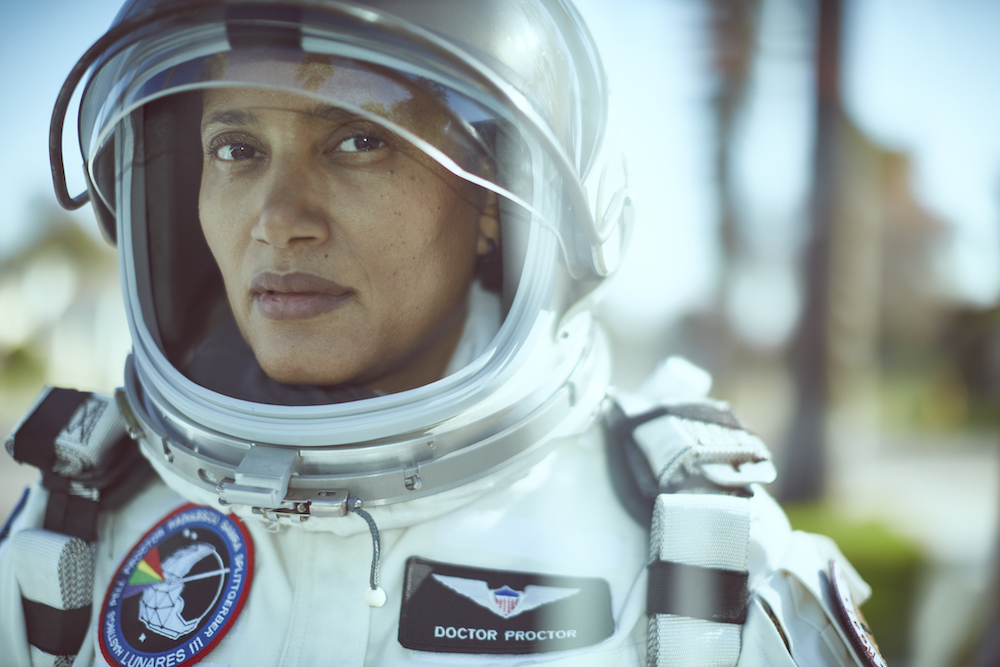
Sian Proctor is an explorer, geoscientist, science communicator, and an analog astronaut who has participated in a number of missions on Earth that simulate space conditions. Most recently, she was part of the all-female SENSORIA Mars 2020 mission at the Hawai’i Space Exploration Analog and Simulation (HI-SEAS) site. Before participating in a Zócalo/ASU Interplanetary Initiative event, “Can Space Exploration Save Humanity?,” she visited the virtual green room to discuss her love of potatoes, the importance of virtual field trips (especially right now), and the advice she gives young people who want to grow up to become astronauts.
What superpower would you most like to have?
Controlling time and space. I want to be a temporal superhero.
What was the biggest difference in being on an all-female mission compared to your prior missions as an analog astronaut?
It was this bonding between the women. It’s a skillset we don’t often celebrate anymore. We had a sewing machine. Who brings a sewing machine to Mars? And we had dance parties together. There were things we were able to do that sometimes it’s harder to do with a mixed crew. Women can get together and be more real with each other because you feel you have a shared experience in that arena.
A good example: We’re living in the HI-SEAS Habitat, and there’s a urinal—that’s where we have to relieve ourselves, in a man’s urinal. And we can have that discussion, and say, “That isn’t right. This needs to change.” That was the topic of a lot of conversation: How do you get more equity in space when space was developed by a male system?
What’s hanging on your living room walls?
I have some NASA memorabilia that belonged to my father. I was born on Guam; my dad worked for NASA during the Apollo missions. And I have an Apollo 11 certificate that was my father’s, and a couple of other Apollo certificates that I proudly hang on my wall.
What’s your biggest pet peeve?
That we don’t have enough empathy for other people collectively around the world. I would love to see us a little less capital-driven and a little more contentment- and stewardship-driven.
You wrote a cookbook called Meals for Mars. What’s the best lesson cooking on Mars can offer those of us cooking through COVID?
Creativity! Figure out what makes you happy when it comes to food and culture. During COVID, you’re stressed out. What are your go-to foods, and what do you need to make yourself feel happy when it comes to eating—and is that linked to health at all? For me, I grew up in a meat-and-potatoes family, and so my comfort is the potato in any form, whether it is french fries or potato chips or mashed potatoes or baked potatoes. I know that about myself. Is that necessarily always healthy? No. And so thinking about my brain’s wiring for my comfort foods during a time of stress, and how do I deal with that if it’s not necessarily a healthy craving?
What is your favorite potato dish, if you had to choose one?
Scalloped potatoes. My mom’s recipe. Totally delicious. Nice cheesy, scalloped potatoes made with chicken broth, so it has that flavor in it. Although I’m trying to lean more toward vegetarian … But I do love my french fry when it’s a fresh-cut french fry, like a Wendy’s french fry—hot and crispy with a lot of salt on it.
Where do you come up with your best ideas?
Often in the middle of the night when I wake up, and I have some kind of insight. And also, when I’m talking to other people. I’m really good at giving other people ideas and advice, or coming up with “aha!” moments when I’m talking with people.
Speaking of advice, what advice do you give young people who want to become astronauts when they grow up?
I tell them to follow their passion, and space will follow. An astronaut by nature is an explorer. So if you can become an explorer, then you have what it takes to become an astronaut in my opinion. It’s all about embracing lifelong learning and exploration. It’s not exploration to humanity; it’s exploration to you. Learning new things and pushing yourself, and really loving engaging in the learning process from not just a knowledge standpoint but an experiential standpoint.
You spent time at Arizona State University working on virtual field trips; what’s it been like seeing them embraced over the past seven months?
I’m a big fan of digital learning and the movement of knowledge through digital media because it’s opening up access. But it’s whether or not we take that knowledge and digital media and make that open. How do we open up knowledge and information? There are a lot of amazing places around the world you can’t necessarily get to, especially during COVID. Virtual field trips don’t replace the place that you’re going; they inspire people who can’t necessarily go there right now to want to go there in the future.
What’s your hidden talent?
Strategic, futuristic thinking. I’m very good at thinking about the future and all the possibilities, and imagining the world that we can create when we come together and have a shared desire to do awesomeness.
Where would you like to travel to once we’re able to travel again?
I’d love to go to Copenhagen to visit my best friend, who moved there right before COVID took over. And, well, the Moon. Realistically, Antarctica is super high on my must-visit list. And there is an eclipse next year in December. So one of my goals is to figure out, how do I get on a boat to Antarctica to see that eclipse?



